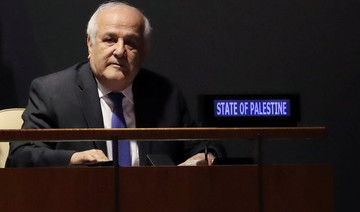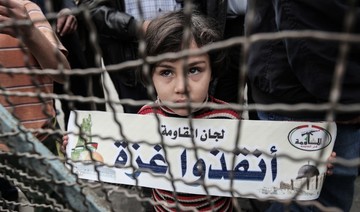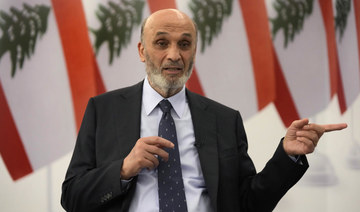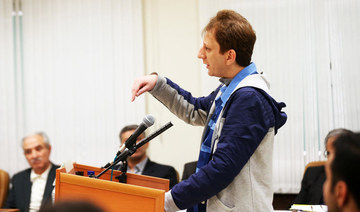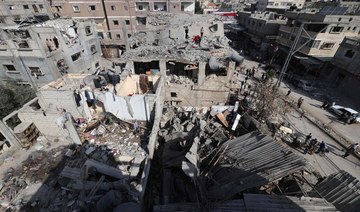UNITED NATIONS: The head of the UN agency that helps 5.3 million Palestinian refugees on Monday urged donors who filled a $446 million hole in its budget last year after the Trump administration drastically cut the US contribution to be equally generous this year.
“Last year we had an extraordinary crisis and an out of the ordinary response,” Pierre Krahenbuhl said in an interview with The Associated Press. “Our humble request to all the donors is: Please keep your funding levels at the same level as 2018.”
He said he has been thanking donors for their “exceptional” contributions that enabled the UN Relief and Works Agency to fund its entire 2018 budget of $1.2 billion.
Krahenbuhl said the agency, known as UNRWA, also adopted a $1.2 billion budget for 2019, and this year it is getting nothing from the United States. Last year, the Trump administration gave $60 million, a dramatic reduction from the $360 million it provided in 2017, when the United States was the agency’s largest donor.
US President Donald Trump said in January 2018 that the Palestinians must return to peace talks to receive US aid money — a comment that raised alarm from leaders of 21 international humanitarian groups, who protested that the administration’s link between aid and political objectives was “dangerous.”
Krahenbuhl said the campaign that UNRWA launched immediately after the US slashed its contribution succeeded as a result of “very important donations,” starting with the European Union, which became the agency’s biggest donor. He said 40 countries and institutions increased funding to UNRWA, including Germany, United Kingdom, Sweden, Japan, Canada and Australia. Qatar, Saudi Arabia, United Arab Emirates and Kuwait each gave $50 million, he said.
“Countries that supported us last year I would say were extremely proud to contribute to the solution,” Krahenbuhl said.
Last year, he said, the number of multi-year funding agreements with donors rose to 19.
So UNRWA right now is in “a somewhat better position” than it was last year, with a shortfall of just over $200 million, Krahenbuhl said.
So far this year, the agency has received $245 million and is expecting $100 million more, he said, which means it should be financially OK until about May.
“But from then on we’ll start to ... reach some crisis points,” Krahenbuhl said.
He said UNRWA is thinking about holding some events in the next two or three months “to collectively mobilize the donor community.” In June, he said, there will be a pledging conference at which the UN and donors will take stock of the agency’s financial situation.
Krahenbuhl said he is committed to making up for the $60 million that UNRWA is losing from the United States this year through internal cost saving measures to reduce the agency’s expenditures.
“That’s going to hurt, but that’s where we feel our financial responsibility, so that we preserve the trust that was generated by the level of donors,” he said, noting that UNRWA last year saved $92 million.
Krahenbuhl said donors recognize the agency does important work. He pointed to the 280,000 boys and girls in UNRWA schools in Gaza and the food assistance the agency provides to 1 million people there every three months. “That’s half of Gaza’s population,” he said.
The UNRWA chief also said that continuing the agency’s services to Palestinian refugees in Syria, Lebanon, Jordan, Gaza and elsewhere in the Mideast “is in everybody’s interest” and important for stability in the region.
“If you take Gaza right now ... it’s continuously at the razor’s edge,” Krahenbuhl said, stressing that any shift in humanitarian assistance or conditions that people live in “can trigger the need for justification, or the excuse ... to go back to war.”
Noting his own experience in the 2014 war between Israel and Hamas, which controls Gaza, Krahenbuhl said, “this is absolutely devastating and needs to be avoided.”
UN agency to donors: Back Palestine efforts anew, keep funding at 2018 levels
UN agency to donors: Back Palestine efforts anew, keep funding at 2018 levels
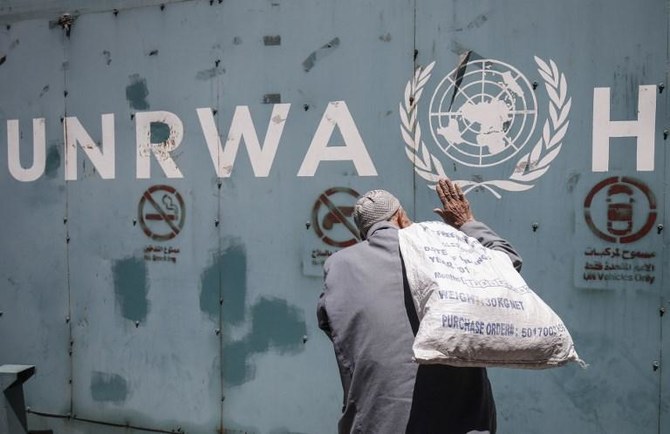
- ‘Exceptional’ contributions enabled the UN Relief and Works Agency to fund its entire 2018 budget of $1.2 billion
- ‘Countries that supported us last year I would say were extremely proud to contribute to the solution’
UAE FM discusses Gaza with Israel’s opposition leader
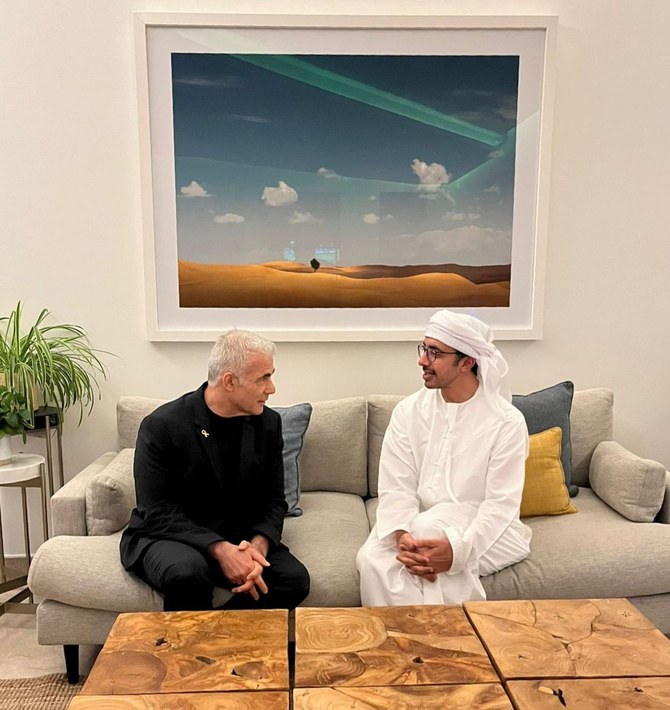
- Sheikh Abdullah stressed the need to restart talks on the two-state solution in Palestine
ABU DHABI: The UAE’s Foreign Minister Sheikh Abdullah bin Zayed Al-Nahyan held discussions on developments in Gaza with Israel’s opposition leader Yair Lapid in Abu Dhabi recently, Emirates News Agency reported on Thursday.
During the meeting, Sheikh Abdullah stressed the need to restart talks on the two-state solution in Palestine, which he said would ensure permanent regional peace and security.
He called for additional efforts to reach an immediate ceasefire in Gaza, which would prevent the conflict spreading to the rest of the region.
Sheikh Abdullah added that it was important for aid to reach Gaza, and that the lives of civilians should be protected.
Palestinian security force kills Islamic Jihad gunman in rare internal clash
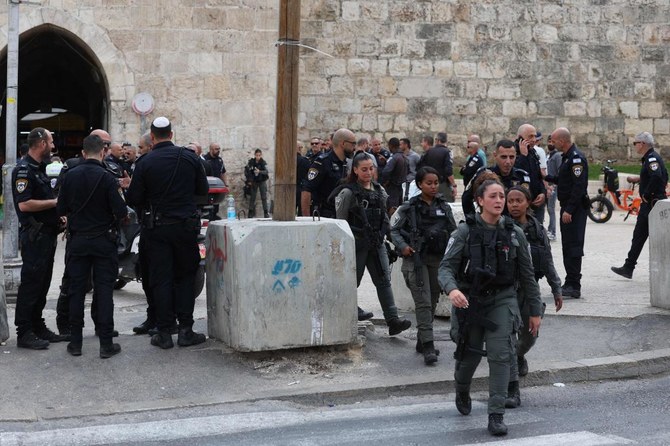
- Al-Foul was “treacherously ... targeted in his car” without provocation, the brigades said in a statement. “This crime is just like any assassination by Israeli special forces.”
RAMALLAH: Palestinian security officers killed a gunman in the occupied West Bank on Thursday, a rare intra-Palestinian clash whose circumstances were disputed and which the fighter’s faction described as an Israeli-style “assassination”.
Palestinian Authority security services spokesperson Talak Dweikat said a force sent to patrol Tulkarm overnight came under fire and shot back, hitting the gunman. He died from his wounds in hospital.
Videos circulated online, and which Reuters was not immediately able to confirm, showed a car being hit by gunfire.
A local armed group, the Tulkarm and Nour Shams Camp Brigades, claimed the dead man, Ahmed Abu Al-Foul, as its member with affiliation to the largely militant group Islamic Jihad.
Al-Foul was “treacherously ... targeted in his car” without provocation, the brigades said in a statement. “This crime is just like any assassination by Israeli special forces.”
President Mahmoud Abbas’ PA wields limited self-rule in the West Bank, and sometimes coordinates security with Israel.
Parts of the territory have drifted into chaos and poverty, with the PA and Israel trading blame, especially since ties have been further strained by Israel’s offensive in Gaza.
Hamas, an Islamic Jihad ally which rules the Gaza Strip and has chafed at Abbas’ strategy of seeking diplomatic accommodation with Israel, denounced “the attacks by the PA’s security forces on our people and our resistance fighters”.
Palestinian security forces and gunmen have exchanged gunfire several times in the last year, but deaths are rare.
EU offers $1 bln in economic, security support to Lebanon
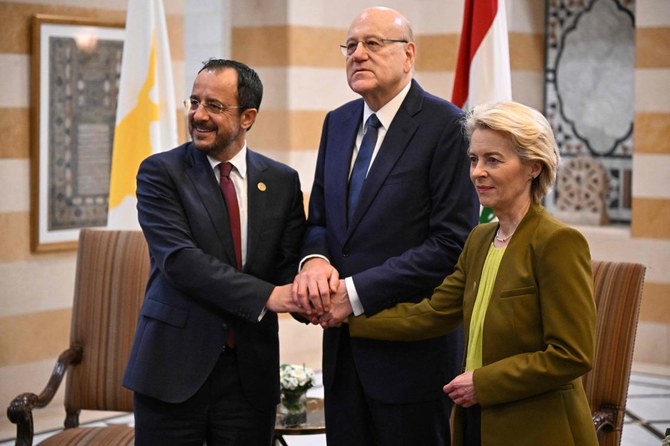
- The funds would be available from this year until 2027
- Von der Leyen said the support package would help bolster basic services in Lebanon, including health and education
BEIRUT: The European Union has offered Lebanon a financial package of 1 billion euros ($1.07 billion) to support its faltering economy and its security forces, European Commission President Ursula von der Leyen said on Thursday during a visit to Beirut.
Von der Leyen said the support package would help bolster basic services in Lebanon, including health and education, though she added that it was crucial for Beirut to “take forward economic, financial and banking reforms” to revitalize the business environment and banking sector.
Speaking alongside Lebanon’s Prime Minister Najib Mikati and Cypriot President Nikos Christodoulides, she said security support to the Lebanese army, the internal security forces and General Security would be focused on providing training, equipment and infrastructure to improve border management.
Lebanon’s economy began to unravel in 2019 after decades of profligate spending and corruption. However, vested interests in the ruling elite have stalled financial reforms that would grant Lebanon access to a $3 billion aid package from the International Monetary Fund.
As the crisis has been allowed to fester, most Lebanese have been locked out of their bank savings, the local currency has collapsed and public institutions — from schools to the army — have struggled to keep functioning.
In parallel, Lebanon has seen a rise in migrant boats taking off from its shores and heading to Europe – with nearby Cyprus and increasingly Italy, too, as the main destinations, researchers say.
Iran slaps sanctions on US, UK over Israel support
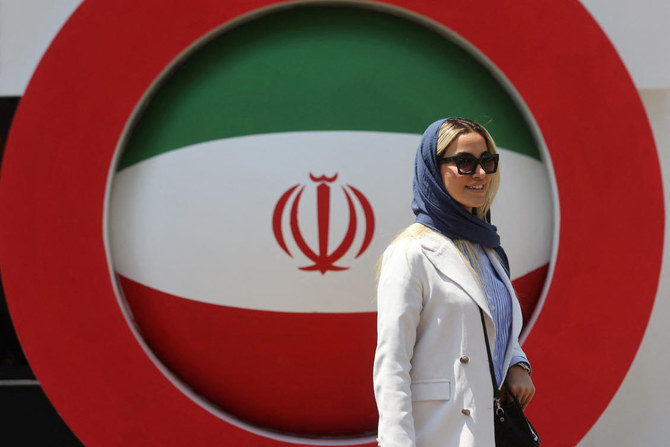
- Sanctions targeted seven Americans
- British officials and entities targeted include Secretary of State for Defense Grant Shapps
TEHRAN: Iran announced on Thursday sanctions on several American and British individuals and entities for supporting Israel in its war against the Palestinian militant group Hamas.
The Islamic republic, the regional arch-foe of Israel, unveiled the punitive measures in a statement from its foreign ministry.
It said the sanctions targeted seven Americans, including General Bryan P. Fenton, commander of the US special operations command, and Vice Admiral Brad Cooper, a former commander of the US Navy’s Fifth Fleet.
British officials and entities targeted include Secretary of State for Defense Grant Shapps, commander of the British army strategic command James Hockenhull and the UK Royal Navy in the Red Sea.
Penalties were also announced against US firms Lockheed Martin and Chevron and British counterparts Elbit Systems, Parker Meggitt and Rafael UK.
The ministry said the sanctions include “blocking of accounts and transactions in the Iranian financial and banking systems, blocking of assets within the jurisdiction of the Islamic Republic of Iran as well as prohibition of visa issuance and entry to the Iranian territory.”
The impact of these measures on the individuals or entities, as well as their assets or dealings with Iran, remains unclear.
The war in the Gaza Strip erupted after the October 7 attack by Palestinian militants on Israel which killed 1,170 people, mostly civilians, according an AFP tally based on official Israeli figures.
Iran backs Hamas but has denied any direct involvement in the attack.
Israel’s retaliatory offensive against Hamas has since killed at least 34,568 people in Gaza, mostly women and children, according to the Hamas-run territory’s health ministry.
12-truck UAE aid convoy enters Gaza Strip
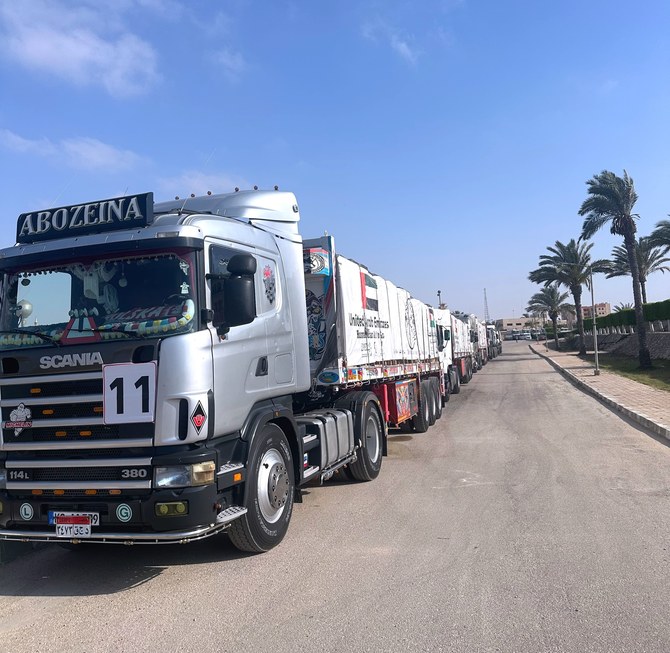
- UAE has also sent Palestinians food, water via sea, air
- Emirates has provided medical treatment for thousands
Al-ARISH: A UAE aid convoy entered the Gaza Strip on Wednesday via Egypt’s Rafah Crossing Point as a part of the country’s “Operation Chivalrous Knight 3” project to support the Palestinian people, UAE state news agency WAM reported on Thursday.
The 12-truck convoy is transporting over 264 tonnes of humanitarian aid including food, water and dates.
The latest convoy now brings to 440 the number of trucks that have been used for support efforts.
As of May 1, 2024, the UAE has now provided the Palestinians 22,436 tonnes of aid, which has included the deployment of 220 cargo planes and three cargo ships. The goods pass through Al-Arish Port and the Rafah crossing into Gaza.
These efforts are a part of the “Birds of Goodness” operation, which involves aerial drops of humanitarian supplies. By Wednesday, 43 drops have been conducted, delivering a total of 3,000 tonnes of food and relief materials to inaccessible and isolated areas in Gaza.
Since its establishment, medical staffers at the UAE’s field hospital in Gaza have treated more than 18,970 patients. An additional 152 patients were evacuated to the UAE’s Floating Hospital in Al-Arish Port, and 166 to the UAE for treatment.
The UAE has set up six desalination plants with a production capacity of 1.2 million gallons per day to support the people in Gaza.


